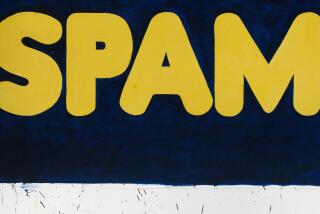The Rude Mechs: No horses but lots of tall tales
- Share via
There’s a lot more to culture in the Lone Star state than dry rub barbecue, the Dallas Cowboys and the collected writings of Rick Perry.
For starters, there’s the Rude Mechs, although rubes from cow towns like New York and L.A. may find it hard to comprehend that an ensemble-based theater company with the conceptual savvy of a semiotics professor and the physical explosiveness of the Sex Pistols could call Austin its hometown.
Even now, roughly 17 years after a handful of renegades formed the collaborative then known as the Rude Mechanicals, company members and their co-conspirators still get dubious stares when they reveal their profession to Texans and non-Texans alike.
“Let’s just say in Texas we’re not considered very Texan,” said Peter Stopschinski, composer and co-lyricist of the Rude Mechs’ latest work, the musical “I’ve Never Been So Happy,” which is having its world premiere this month at the Kirk Douglas Theatre in Culver City. “When we go outside of Texas everybody’s like, ‘Texan!’”
Chimed in Lana Lesley, Rude Mechs’ founding co-producing artistic director, “It’s that, ‘Oh, where’s your horse?’ bit.”
In fact, the Rude Mechs fly their state colors with pride, mostly, as they demonstrate in “I’ve Never Been So Happy.”
A mock epic, country-metal operetta about star-crossed lovers in a vanishing American West, “I’ve Never Been So Happy” deals with themes of romance (both for people and places), questions of existential freedom vs. captivity, and the skanky but lovable qualities of pet canines.
Its characters include a young woman pressed to perform in her brutal father Brutus’ “Hee Haw” style variety show; a young man raised in a “wymyn’s” commune whose mother sends him out into the world strapped to a mountain lion; a small-town sheriff who might’ve strolled in from a Kurt Weill cabaret show; and Sigmunda and Sigfried, two dachsunds possessed with bouncy charm and Wagnerian appetites for repellent chow.
At intermission, L.A. audiences can participate (or not) in an elaborate “shindig” of carnival/country fair-type attractions, set out environmentally in the Kirk Douglas’ lobby. Finding innovative ways to engage audiences, particularly younger ones, on-stage and off is one of the group’s signatures, in keeping with its belief that serious theater shouldn’t preclude cheap laughs.
“When we did our workshops here at Austin, we had a western carnival [where] you could like taste margaritas or touch a gun or crank-call a Yankee,” said Kirk Lynn, another of Rude Mechs’ founding co-producing artistic directors and the playwright of “I’ve Never Been So Happy.”
Named after the misbegotten, inadvertently hilarious amateur thespians in Shakespeare’s “A Midsummer Night’s Dream,” the Rude Mechs are known for mixing the sublime with the ridiculous, the elegiac and erudite with potty humor and punk aesthetics.
In one Rude Mech show, “El Paraiso,” the Austrian philosopher Ludwig Wittgenstein crosses paths with James Dean in purgatory, i.e. a whiskey bar evidently somewhere near Marfa, Texas, where Dean costarred in “Giant.”
In “Lipstick Traces,” which was based on Greil Marcus’ intellectual-shotgun blast of a book and performed at UCLA’s Macgowan Little Theater in 2002, the Rude Mechs explored the mysterious connections among the Dadaists, Johnny Rotten and other fringe-artist bomb throwers.
And in “The Method Gun,” which the Kirk Douglas hosted last summer, the Rude Mechs payed what Times theater critic Charles McNulty described as “humorous homage” to a fictitious acting guru named Stella Burden with more than a passing resemblance to Stella Adler.
Michael Ritchie, CTG’s artistic director, said that the critical and box-office success of “Method Gun” sealed his company’s evolving relationship with the Rude Mechs. “It brings some unique voices into our building,” he said of the troupe. “It’s more than a marriage of convenience in that I think both organizations and audiences are elevated by it.”
Like several of the company’s shows, “The Method Gun” simultaneously spoofs and interrogates the creative process itself, a suitable fixation for a company that in some ways operates more like a rock band than a theater ensemble.
“There’s that band culture of Austin, like everybody you know is in like five bands,” said Thomas Graves, who’s co-directing “I’ve Never Been So Happy” with Lesley. “And so there’s this culture of band-ness where it’s like getting in a room together and just messing around, but with theater.”
After functioning for years as a bootstrap organization, the Rude Mechs recently received a National Endowment for the Arts grant that underscores their rising stature. But they remain attached to their original ethic, and artistic decisions still are hammered out by the group, in frontier-democracy style.
“The loudest voice on any given day wins — for that day,” Lesley said. “The rule is, when we stop having fun, we quit.”
More to Read
The biggest entertainment stories
Get our big stories about Hollywood, film, television, music, arts, culture and more right in your inbox as soon as they publish.
You may occasionally receive promotional content from the Los Angeles Times.











